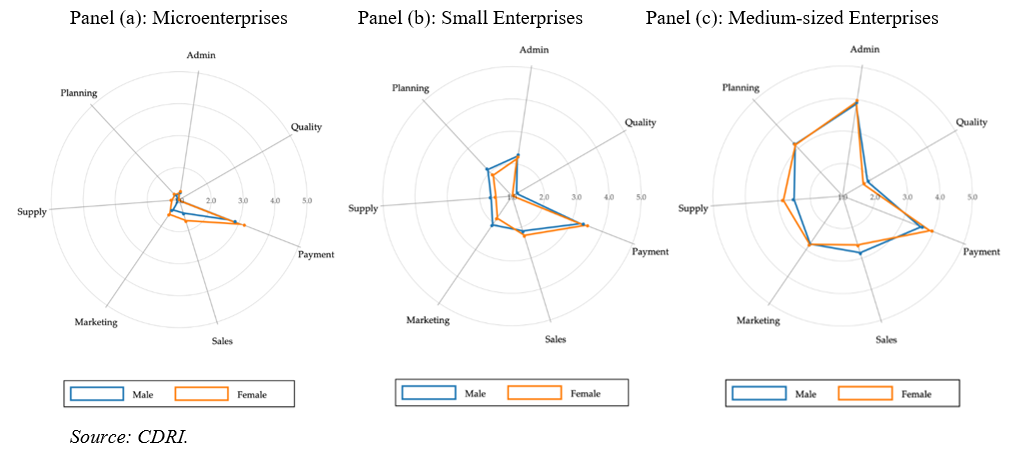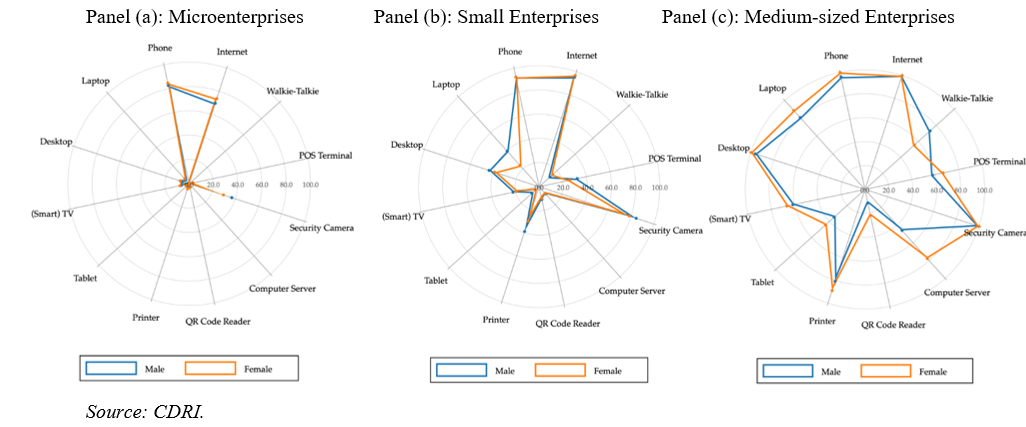Driving Cambodia’s Long-Term Vision through Women-Led and Digital MSME Development



Key Messages:
- Empowering women in Cambodia’s MSMEs sector is key to unlocking innovative, sustainable, and inclusive growth.
- While women make up the majority of MSME owners, they face systematic challenges including informal business registration, restricted access to information, limited opportunities for skills training and capacity-building programmes, financial constraints, and barriers to business aspirations and networking.
- Additional challenges include insufficient infrastructure, cybersecurity concerns, and limited regulatory frameworks to support the adoption of digital initiatives.
- Smaller firms, which are dominated by female ownership, tend to rely more on manual processes and use fewer digital devices in their business operations.
- Policy recommendation to enhance women’s contributions to the digital economy include strengthening data collection and research, promoting MSMEs registration and formalisation, improving access to digital training and capacity-building, expanding financial access, accelerating digital transformation in MSMEs, and establishing a roadmap for women-led MSMEs in digitalisation.
- These efforts will drive Cambodia’s aspirations for inclusive and sustainable long-term development.
If Cambodia is to achieve its long-term vision, significant transformations in the economy and workforce are necessary. In this regard, the shift towards digital practices is crucial for sustained growth, particularly within Micro, Small, and Medium-sized Enterprises (MSMEs), which form the backbone of Cambodia's economy. MSMEs are pivotal to economic growth, accounting for substantial employment, supporting local communities, and serving as significant sources of Cambodia’s national income. Female entrepreneurs, particularly in MSMEs, represent considerable yet underutilised potential within this sector. Evidence from global experiences suggests that increasing female participation in MSMEs fosters economic stability, resilience, and growth.
According to the Cambodia Economic Census 2022 the country has 753,670 business establishments, with women owning 69.1 percent of them. Women are more likely to run businesses that operate with fewer workers, as 82.4 percent have one or two employees, and 33.7 percent have exactly two employees. Thus, small businesses with one or two employees account for the majority. The wholesale and retail trade sectors, including motor vehicles and motorcycle repair, accounts for 65.6 percent of all establishments. Accommodation and food service activities, such as restaurants and mobile food services, account for 14.2 percent While manufacturing represents 6.6 percent. Other service activities, such as hairdressing and beauty treatments, contribute 6.9 percent. Geographically, 20 percent of all establishments are in Phnom Penh, followed by Kandal (7.6 percent), Siem Reap (6.7 percent), and Battambang (6.6 percent).
According to the results from CDRI’s recent survey, in partnership with the Asian Development Bank, using primary data from 414 MSMEs and 32 key informant interviews, the findings suggest that MSMEs in Cambodia are mostly small and informal. Nearly half of the firms are individual-run, and many lack formal registration, limiting their access to finance, business networks, and resources. This informality especially affects women-led businesses, holding back their ability to scale, innovate, and adopt digital practices. The challenges faced by these businesses perpetuate economic vulnerability, restricting their potential for growth.
Several key barriers hinder the broader adoption of digital technologies across MSMEs. Limited access to information leaves many business owners unfamiliar with available digital tools and practices. Skill gaps, and lack of technical expertise also discourage investment in these areas. Financial access remains a critical challenge, as many MSMEs struggle to secure the necessary funding. Moreover, business aspirations and attitudes toward climate change influence the adoption of sustainable practices. Interviews with key informants also highlighted additional barriers, such as unreliable infrastructure, cybersecurity concerns, and insufficient regulatory frameworks to support digital initiatives.
The findings also suggest that while MSMEs in Cambodia are starting to accept digital transformations, the adoption rates are still relatively low and vary by firm size. Microenterprises typically use smartphones and basic digital tools for sales and marketing but lack the necessary infrastructure for broader digitalisation. In contrast, small and medium-sized enterprises (SMEs) tend to adopt a wider range of digital tools, particularly for business administration. Interestingly, the adoption of digital practices does not show significant gender differences when comparing firms of similar size. Regardless of ownership, MSMEs adopt similar levels of digital technologies. This suggests that the gender gap in adoption may stem more from differences in firm size than from gender itself.
Figure 1 illustrates digital technology adoption by firm size and gender. The findings highlight three key patterns in digital technology adoption across business functions based on firm size and the owner’s gender. First, larger firms show higher levels of digital technology adoption. Overall, adoption among microenterprises was very low, as they primarily relied on traditional methods. In contrast, SMEs integrated digital tools more extensively, particularly in administration, planning, supply chain management, marketing, sales, and payment processing, though adoption in quality control was relatively lower. Second, payment processing had the highest adoption rates, even among microenterprises. Finally, gender differences were more pronounced among microenterprises, where female owners were more likely to use digital tools for sales and payments, particularly through social media. However, SMEs showed minimal gender disparities in digital technology adoption.
Figure 1: Digital Technology Adoption by Firm Size and Gender

Figure 2 illustrates digital device ownership by firm size and gender. The findings suggest a few key patterns. First, larger firms adopt a greater variety of digital devices at higher rates. Among all devices, smartphones and mobile internet have the highest adoption rates, even among microenterprises. Small enterprises tend to use a wider range of devices, including security cameras, printers, desktops, laptops, and POS terminals. Medium-sized enterprises utilise nearly all available digital devices. Second, gender differences in digital device ownership were found to be less significant.
Figure 2: Digital Device Ownership by Firm Size and Gender

To align with Cambodia’s long-term development goals, MSMEs growth must embrace digital transformation. Gender inclusivity is essential to unlocking the full potential of the workforce, fostering innovation, sustainability, and economic resilience. The following policy recommendations aim to support the digital transition of MSMEs while addressing barriers for women entrepreneurs:
- Strengthen data collection and research: Formalisation may be a significant challenge, given that the majority of MSMEs in Cambodia operate informally and lack registration. However, the immediate priority should be to strengthen data collection efforts to better understand the landscape. Conducting regular surveys with both formal and informal MSME owners will provide valuable insights into the challenges they face and their reluctance to register. Additionally, establishing a dedicated research centre to analyse MSMEs trends, inform policy decisions, and track progress on formalisation efforts will be crucial in designing effective strategies for sustainable growth and integration into the formal economy.
-
Encourage formal business registration and promote MSME formalisation: Promoting stronger links between economic development and MSMEs in Cambodia begins with a well-defined strategy for MSMEs formalisation. Formalisation serves as the foundation for effective economic governance, enabling the government to collect essential data on SMEs challenges, opportunities, and needs. This, in turn, informs evidence-based policymaking and facilitates targeted investments in infrastructure and human capital, benefiting businesses of all sizes, not just large enterprises. To encourage MSMEs to register, administrative burdens should be reduced, and tax benefits or financial incentives should be introduced. Strengthening linkages between SMEs and foreign investment will allow formalised businesses to integrate into supply chains and access larger markets.
-
Enhance access to digital training and capacity building: Expanding digital training and capacity-building initiatives is essential for promoting MSMEs growth, particularly among women entrepreneurs. Gender-responsive training programmes on digital tools, financial management, and economic benefits of technological adoption should be developed in collaboration with educational institutions and NGOs to ensure inclusivity and relevance. Additionally, networking and mentorship programmes can play a crucial role in supporting women entrepreneurs as they adopt digital solutions, providing them with guidance, peer support, and business development opportunities.
-
Expand access to finance: Expanding access to finance is essential for supporting MSMEs, particularly those led by women, and ensuring that business owners can use loans effectively for productive purposes. Loans should be directed towards productive purposes where the earnings from investments exceed the interest payments. It is critical that business owners select loans from formal institutions offering reasonable interest rates. To facilitate this, targeted loan programmes with affordable rates and flexible terms should be developed, particularly for women-led MSMEs. In addition, financial literacy training should be promoted alongside streamlined access to credit, ensuring that business owners can make informed borrowing decisions and reduce risks. Moreover, productive lending should be encouraged by linking credit access to high-potential business activities, ensuring that investment returns outweigh the interest payments and fostering sustainable growth for MSMEs.
-
Accelerate digital transformation in MSMEs: To accelerate the digital transformation of MSMEs, targeted support should be provided for micro and small enterprises to transition from manual processes to digital administration. This includes implementing digital solutions for record-keeping, e-payments, online marketing, and business functions such as planning, sales, and supply chain management. For medium-sized enterprises, it is important to promote the adoption of a diverse range of the latest digital tools, such as smartphones, tablets, laptops, POS terminals, security cameras, and cloud-based management software, as well as AI-driven analytics to enhance operational efficiency.
-
Establish a digital roadmap for women-led MSMEs: To drive digital transformation in women-led MSMEs in Cambodia, the roadmap should focus on improving digital infrastructure, offering gender-responsive digital literacy programmes, and streamlining the formalisation process with incentives like tax benefits. Targeted financial support, such as low-interest loans, should be provided for digital tool adoption. Strengthening links with larger enterprises and global markets will expand opportunities, while gender-disaggregated data will help tailor policies to women’s specific challenges. This approach will foster the growth and competitiveness of women-led MSMEs, contributing to Cambodia's economic formalisation and global integration.
To conclude, as Cambodia aspires to achieve its long-term vision, continued growth through digital integration for MSMEs is vital. Women, who make up over half of Cambodia's population, dominate ownership in MSMEs but face systemic barriers that limit their potential. By enabling women to fully participate in digital transformations, Cambodia can unlock significant opportunities for innovation, sustainability, and economic resilience, contributing to its long-term development.







